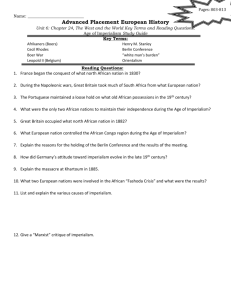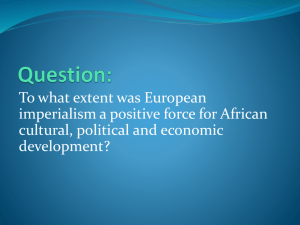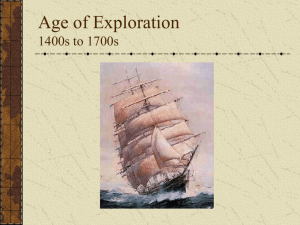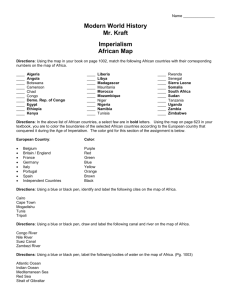POSITIVE effects of imperialism in Africa
advertisement
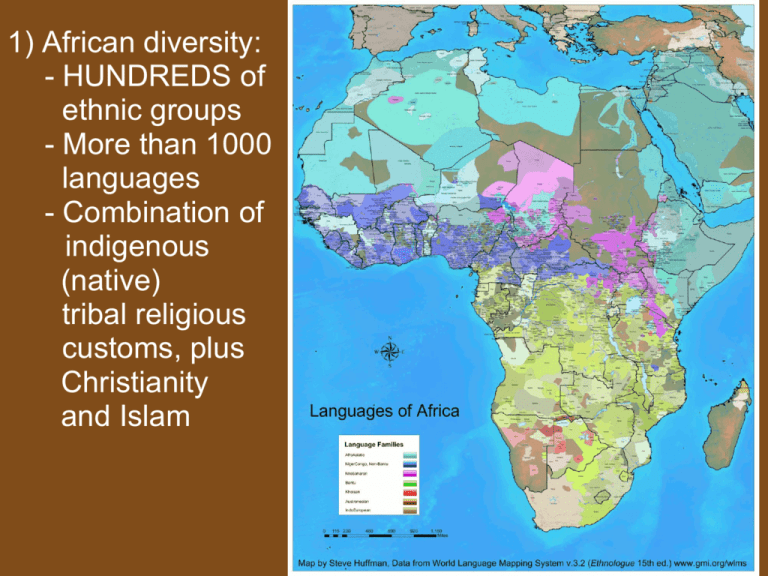
1) African diversity: - HUNDREDS of ethnic groups - More than 1000 languages - Combination of indigenous (native) tribal religious customs, plus Christianity and Islam 2) Primary basis for European interaction with Africa, before the age of imperialism: The slave trade! 3) Early obstacles to greater European interference in Africa: 1. Armed African resistance 2. Impassable geography (jungles, rivers, mountains, deserts… no infrastructure) 3. Disease (esp. malaria) 4) First major claim of African territory: King Leopold II of Belgium, in the Congo River Valley 4) Belgian Congo (cont.): Leopold licensed companies that brutally exploited Africans, with hard labor and harsh penalties for not making work quotas… at least 10 million Congolese died. 5) Following Belgium into Africa: 6) Causes of [African] imperialism (WHY?): 1. ECONOMIC: capitalism, industrial growth - cheap access to raw materials / natural resources - access to new, expanded global markets & trade routes 2. NATIONALISM: pride & prestige 3. CULTURAL / SOCIAL: Missionary efforts (converting Africans to Christianity) Racism, Social Darwinism (economic survival of the fittest) *Ethnocentrism – judging one's own culture as superior to all others... resulting “duty” to force one's own idea of “progress” and “civilization” on others 4. SECURITY: defense, protection of territory & trade routes, keep up with rival powers (keep balance of power?) Special importance of EGYPT to BRITAIN: The Suez Canal provides a shorter route to Britain’s imperial possessions (India, Australia). 7) HOW Europe conquers Africa so easily: 1. Industrial Europe has superior military technology 2. Industrial Europe has superior technology associated with transportation, communication & infrastructure (steamships, railroads, telegraph) … these allow conquering nations to extend control 3. European medicinal advances (i.e. quinine) to protect against disease 4. Euro powers play rival African groups against one another: - exploit existing tribal & religious conflicts - prey upon African diversity & lack of African unity = DIVIDE & CONQUER 8) Berlin Conference (1885): Purpose: Europeans seek to avoid war while establishing “rules” for the conquering of Africa Outcome: Africa divided up among Euro powers with no consideration of traditional ethnic regions … problems to follow. 9) Only independent African nations by 1900: Ethiopia strong leader, well armed, favorable geography (mountains) Liberia U.S. ties (founded as freed slave colony, became independent in 1847) 10) Industrial Europe seeks control of Africa for RESOURCES and as a new MARKET… Africa is quite profitable for the former, but not the latter (too poor!) 11) Europe changes the African economy: BEFORE: SUBSISTENT farming (self-sufficient!) Individual farmers locally grow, produce & barter all that is needed to support community needs. AFTER: CASH-CROP PLANTATIONS - Large-scale commercial farming, owned by Europeans - FEW crops grown in LARGE VOLUME for EXPORT, rather than to feed local communities EFFECT: Africa transitions from a SUBSISTENT economy to a MARKET economy (Africans now paid low WAGES) 12) Competition in SOUTH AFRICA: Large deposits of GOLD and DIAMONDS Original settlers: Dutch farmers (Boers)… the British follow… African tribes lose to both (>dozen, largest is Zulu). 13) Boer War (1899): - War between Boers (Dutch settlers) and British for control of South Africa... - Won by British - Biggest losers: Africans! (legacy: apartheid) 14) European partitioning of Africa: European approach: take whatever they could hold on to, with no regard for local ethnic groupings. Problems (then): arbitrary boundaries combined diverse (and sometimes competing) ethnic & tribal groups, AND/OR unnaturally divided single ethnic groups into multiple areas of European control. Problems (now): Modern African borders (among 54 nations) largely a legacy of European imperialism… has led to present-day civil wars, power struggles, and competition over resource wealth by competing ethnic groups. 15) NEGATIVE effects of imperialism in Africa: … Lost sovereignty (loss of independence) … Large-scale death from: European diseases (i.e. smallpox), armed resistance to Euro invaders, hunger & famine from conversion to cash-crop commercial farming … Forced assimilation (lost culture & traditions… esp. language!) ... Discrimination & racist policies ... native people treated as “second class citizens in their own homes” … Combining different ethnic groups OR dividing same ethnic groups (= African ethnic conflict today) ... Economic imperialism (wealth from African resources exported to imperial nations) 16) POSITIVE effects of imperialism in Africa: … Reduced tribal & ethnic warfare (in areas under imperial control) … Improved health & medicine* (= longer lifespans) … Improved education & literacy (but not too much!)* ... Improved infrastructure* (transportation & communication networks) … Improved agricultural technology & techniques* … Some economic growth (in international market for African goods) * Primary motive is to benefit Europeans first 17) European imperialism: positives v. negatives: 1. Negatives outweigh positives in quantity & weight 2. Many positives designed to help European conquerors… secondary benefits to Africa 3. African wealth (in resources and people) benefitted Europeans first 4. Modern effects: - Political instability (dictators, civil wars, absence of democracies) - Immense poverty from a lack of economic development & growth - Unsustainable population growth - Poor health care (dying from treatable diseases)



